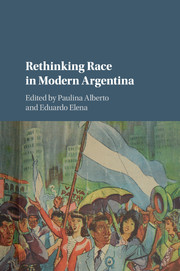Epilogue: Whiteness and its discontents
Published online by Cambridge University Press: 05 March 2016
Summary
In July 1975, I arrived in Buenos Aires to begin a year of dissertation research on the city's black population. My plan was to use municipal censuses to document the disappearance of that population over the course of the 1800s. Settling in to the Archivo General de la Nación, I was welcomed by the community of historians – mostly Argentine, some foreign – carrying out research there. They were friendly and helpful but somewhat nonplussed by my project. My colleagues were well aware that Africans and Afro-Argentines had formed a significant part of the city's population in the late colonial period and early 1800s. But they also knew that by the end of the 1800s black people were no longer a significant component of the city's society (the 1887 municipal census set their numbers at less than 2 percent of the total population). The big story of the 1800s, and even more of the 1900s, was the arrival of the immigrants and the resulting transformation of Argentine society, culture, and politics. Why, then, spend my time investigating a topic of purely antiquarian interest, and a people who had left no visible traces in the nation of which they had once formed part?
What a difference forty years make! As this volume makes clear, the terms of that scholarly conversation have decidedly shifted, as the notion of White Argentina (to use the term proposed in the chapter by Gastón Gordillo), hegemonic during most of the 1900s, has now been challenged by visions of a multiracial, multicultural Argentina. As the volume's introduction suggests, one of the effects of this rather seismic shift has been to undermine claims of Argentina's national exceptionalism and to bring the country into much closer dialogue not just with its Latin American neighbors but with multiracial societies across the globe. Argentina is hardly alone, after all, in having its longstanding claims to whiteness called into question. In recent decades intensifying migration from Latin America, Asia, and Africa has transformed the ethnic and racial composition of the United States, Canada, and much of Europe. Argentina's transition from hegemonic whiteness to highly contested multiculturalism is an experience that cries out for comparison with those North Atlantic cases (not to mention Australia, where similar demographic shifts are currently under way).
- Type
- Chapter
- Information
- Rethinking Race in Modern Argentina , pp. 318 - 326Publisher: Cambridge University PressPrint publication year: 2016
- 4
- Cited by



